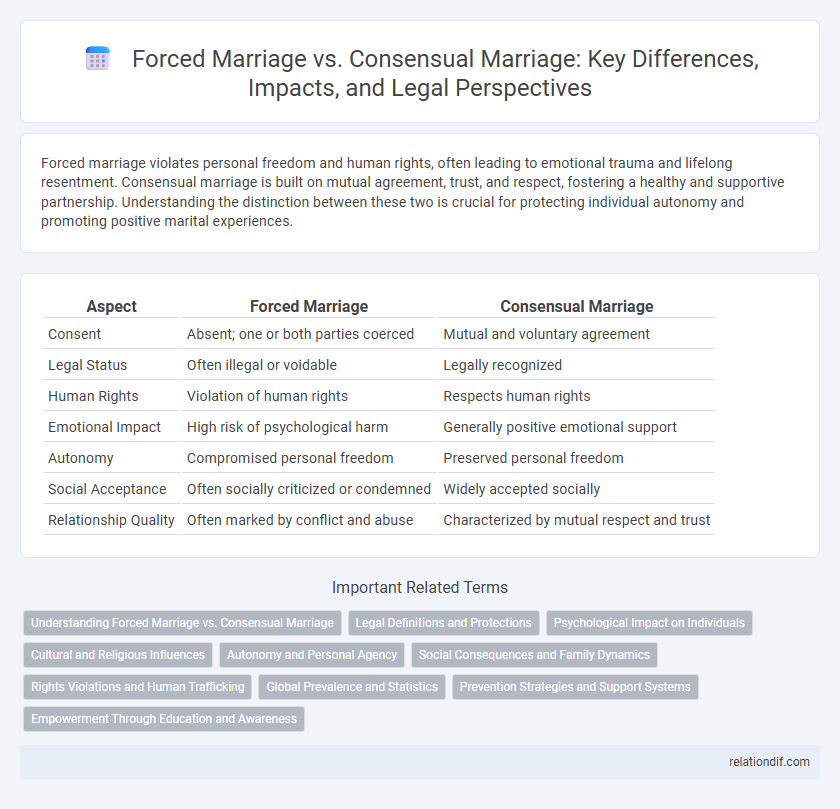Forced marriage violates personal freedom and human rights, often leading to emotional trauma and lifelong resentment. Consensual marriage is built on mutual agreement, trust, and respect, fostering a healthy and supportive partnership. Understanding the distinction between these two is crucial for protecting individual autonomy and promoting positive marital experiences.
Table of Comparison
| Aspect | Forced Marriage | Consensual Marriage |
|---|---|---|
| Consent | Absent; one or both parties coerced | Mutual and voluntary agreement |
| Legal Status | Often illegal or voidable | Legally recognized |
| Human Rights | Violation of human rights | Respects human rights |
| Emotional Impact | High risk of psychological harm | Generally positive emotional support |
| Autonomy | Compromised personal freedom | Preserved personal freedom |
| Social Acceptance | Often socially criticized or condemned | Widely accepted socially |
| Relationship Quality | Often marked by conflict and abuse | Characterized by mutual respect and trust |
Understanding Forced Marriage vs. Consensual Marriage
Forced marriage involves one or both individuals being compelled into matrimony without their free and full consent, often violating human rights and legal statutes. Consensual marriage, by contrast, is based on mutual agreement, where both parties willingly enter the union with free choice and understanding. Recognizing the differences is crucial for safeguarding individual autonomy and promoting lawful, ethical marital practices worldwide.
Legal Definitions and Protections
Legal definitions distinguish forced marriage as an arrangement without the free and full consent of one or both parties, often violating human rights and constituting a criminal offense in many jurisdictions. Consensual marriage is legally recognized when both individuals willingly agree to the union, ensuring protections such as mutual rights, property claims, and legal recourse in case of disputes. Laws against forced marriage provide mechanisms including annulment, protective orders, and penalties for coercion, emphasizing the importance of voluntary consent in marriage legality.
Psychological Impact on Individuals
Forced marriage often leads to severe psychological distress, including anxiety, depression, and post-traumatic stress disorder, due to the lack of autonomy and coercion involved. Consensual marriage typically promotes emotional well-being and relationship satisfaction as individuals enter the union willingly, fostering mutual respect and support. Long-term mental health outcomes are significantly more positive in consensual marriages where individuals have agency over their life choices.
Cultural and Religious Influences
Cultural and religious influences play a significant role in shaping attitudes towards forced and consensual marriage, often dictating the acceptability and prevalence of these practices in various communities. In many cultures, arranged marriages rooted in religious traditions may blur boundaries between consent and coercion, highlighting the importance of understanding local customs when addressing forced marriage. Recognizing the distinction between cultural norms and individual rights is crucial for promoting consensual marriage and safeguarding personal freedom.
Autonomy and Personal Agency
Forced marriage infringes on individual autonomy by denying personal agency and coercing individuals into unions without free consent, often violating human rights and ethical standards. Consensual marriage upholds autonomy by allowing individuals to exercise personal choice and mutual agreement, fostering respect and equality within the partnership. Prioritizing personal agency in marriage decisions is essential for emotional well-being, legal recognition, and social empowerment.
Social Consequences and Family Dynamics
Forced marriage often results in strained family dynamics, leading to mistrust, emotional distress, and weakened social bonds within communities. Consensual marriage promotes mutual respect, emotional support, and stronger family cohesion, enhancing social stability and overall well-being. Societies with prevalent forced marriages face higher risks of domestic violence, mental health issues, and social alienation, contrasting with healthier interactions in consensual marital unions.
Rights Violations and Human Trafficking
Forced marriage constitutes a severe violation of human rights, often involving coercion, intimidation, and the absence of free consent, thereby undermining individual autonomy and dignity. Unlike consensual marriage, where both parties willingly agree, forced marriage can lead to exploitation and frequently intersects with human trafficking networks, trapping victims in cycles of abuse and control. International laws and human rights organizations emphasize the critical need to distinguish and prevent forced marriages to protect vulnerable individuals from trafficking and ensure their fundamental freedoms.
Global Prevalence and Statistics
Forced marriage affects an estimated 15 million individuals globally each year, with the highest prevalence reported in South Asia, Sub-Saharan Africa, and parts of the Middle East. Consensual marriages dominate in Western countries, where legal frameworks and cultural norms emphasize individual choice, resulting in significantly lower rates of forced unions. Statistical data from UNESCO and WHO highlight that regions with high forced marriage rates correlate strongly with limited access to education and women's rights.
Prevention Strategies and Support Systems
Prevention strategies for forced marriage include comprehensive education programs that raise awareness about individual rights and legal protections, alongside community engagement initiatives targeting vulnerable populations. Support systems involve accessible helplines, safe shelters, and counseling services that provide immediate assistance and long-term empowerment to victims. Collaboration between governments, NGOs, and local leaders strengthens enforcement of anti-forced marriage laws and promotes cultural shifts toward consensual marriage practices.
Empowerment Through Education and Awareness
Empowerment through education and awareness plays a crucial role in distinguishing forced marriage from consensual marriage by equipping individuals with knowledge about their rights and the legal consequences of coercion. Access to comprehensive sexual and human rights education fosters critical thinking and self-advocacy, enabling potential victims to recognize and resist forced marriage pressures. Community outreach programs and awareness campaigns further support cultural shifts towards valuing consent and personal choice in marital decisions.
forced marriage vs consensual marriage Infographic

 relationdif.com
relationdif.com